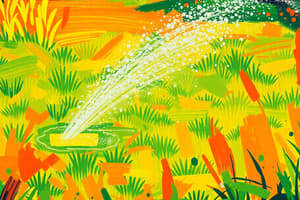Podcast
Questions and Answers
Most warm season grasses require frequent watering to remain healthy and colorful.
Most warm season grasses require frequent watering to remain healthy and colorful.
False (B)
The ideal time to water your lawn is between 5 and 9 pm.
The ideal time to water your lawn is between 5 and 9 pm.
False (B)
Lawns generally require 2 inches of water each week.
Lawns generally require 2 inches of water each week.
False (B)
Overwatering can lead to a shallow root system in grass.
Overwatering can lead to a shallow root system in grass.
Natural storm rain is always sufficient for lawn hydration.
Natural storm rain is always sufficient for lawn hydration.
Monitoring the lawn for signs of dehydration can help adjust watering practices appropriately.
Monitoring the lawn for signs of dehydration can help adjust watering practices appropriately.
The conditions in your area do not impact how quickly water evaporates from your lawn.
The conditions in your area do not impact how quickly water evaporates from your lawn.
Watering in the evening is beneficial for preventing turf diseases.
Watering in the evening is beneficial for preventing turf diseases.
Flashcards
How much water does my lawn need?
How much water does my lawn need?
The amount of water your lawn needs to thrive.
When is the best time to water?
When is the best time to water?
The best time to water your lawn, when temperatures are cooler and evaporation is minimal.
What happens if I overwater?
What happens if I overwater?
Watering too much can harm your lawn by creating shallow roots and encouraging disease.
How do I know if my lawn needs water?
How do I know if my lawn needs water?
Signup and view all the flashcards
How should I adjust my watering schedule?
How should I adjust my watering schedule?
Signup and view all the flashcards
Does rain always provide enough water?
Does rain always provide enough water?
Signup and view all the flashcards
Why water early in the morning?
Why water early in the morning?
Signup and view all the flashcards
Why avoid evening watering?
Why avoid evening watering?
Signup and view all the flashcards
Study Notes
Watering Lawns
- Most warm-season grasses tolerate heat and drought, but need 1-1.5 inches of water weekly.
- Watering frequency/duration may need adjustment based on area conditions (temperature, rainfall, soil type).
- Deep watering promotes strong root systems.
- Monitor lawns for indicators of needing more water (footprints that don't spring back, bluish-gray color, wilting).
- Morning watering (5-9 am) minimizes evaporation and prevents disease.
- Adjust watering based on climate, humidity, and rainfall.
- Avoid overwatering which can lead to shallow roots, disease, and waste.
Best Watering Practices
- Deep, infrequent watering encourages deep root growth (2x per week, 35-40 minutes each time).
- Distribute water evenly to avoid dry or soggy spots.
- Monitor moisture levels and adjust accordingly.
Studying That Suits You
Use AI to generate personalized quizzes and flashcards to suit your learning preferences.




